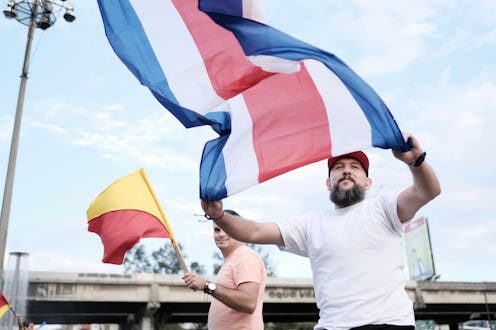News
Why Costa Rica’s Presidential Race Mattered So, SO Much For LGBTQ Rights

The human rights of LGBTQ people were on the line in a presidential runoff Sunday in the most tolerant country in Central America. Activists there can now let out a huge sigh of relief Costa Rica elected a pro-gay presidential candidate in a race that had huge implications for gay and trans rights throughout Central America. Trans women are killed in the region at among the highest rates in the world, and Costa Rica is one safe haven for LGBTQ people in Latin America.
Center-left candidate Carlos Alvarado Quesada, who unhesitatingly embraced marriage rights for same-sex couples in the campaign, crushed his conservative evangelical opponent. The race was expected to be close, but preliminary numbers showed Alvarado Quesada taking home more than 60 percent of the vote.
His opponent had spoken out openly against gay marriage throughout the campaign, forcing the issue to the forefront. Some political veterans called the race all but a "de facto referendum on same-sex marriage."
The debate on LGBTQ rights is not foreign to presidential campaigns in the United States, but never has it taken center stage quite the same way that Costa Rica saw — even in 2004 when President George W. Bush endorsed a constitutional amendment banning gay marriage to court conservative votes.
A marriage equality ruling from the Inter-American Court of Human Rights in January found that governments "must recognize and guarantee all the rights that are derived from a family bond between people of the same sex." The outgoing Costa Rican government spoke out in support of the ruling and promised to adopt it, "in its totality."
That opened the path for the evangelical candidate who lost, Fabricio Alvarado Muñoz to attack the advancement of gay rights in the country (yes, the winning and losing candidate have the same first last name).
"We are not ready for a LGBT agenda,” Alvarado Muñoz said at a candidate debate before the first round of voting. “Let’s make February 4 our referendum on the marriage between men and women."
His support skyrocketed from about 3 percent after he began to speak against LGBTQ rights. In the first round in February, Alvarado Muñoz took first place, with 25 percent of the vote. That allowed him to continue a campaign based on allowing legal discrimination.
Alvarado Muñoz proposed removing Costa Rica from the international treaty on human rights that gives the Inter-American court jurisdiction. "We propose the sovereignty of the family as the fundamental basis of society," Alvarado Muñoz said during the runoff campaign. “Costa Rica has sent a message to traditional parties — never again will they meddle with the family.”
But the people of Costa Rica disagreed, handing the presidency to the pro-equality candidate. That has huge implications — far beyond marriage equality in just one country. The Inter-American Court of Human Rights has also ruled on transgender rights, telling Costa Rica that it must allow transgender citizens to change their names on identity cards and passports.
Central America is a region where transgender women in particular are at risk of violence. In many countries, like Honduras, Guatemala, and El Salvador, trans citizens cannot count on local authorities to protect them. The Inter-American Commission on Human Rights reported last year that there were an "alarming numbers of LGBT killings" in the region last year.
Amnesty International has reported that many gay men and trans women have sought asylum in Mexico to flee widespread violence. The NGO also reported on situations in these countries, and the serious violence that many face.
The one exception in the region has been Costa Rica. The outgoing vice president, Ana Chacón, has attended international summits on LGBTQ rights and the safety of trans women in Central America. She oversaw the judicial consult on both marriage equality and trans rights, and under her leadership the government has ensured that the country's Ministry of Education recognizes trans students' gender identities — something that has been rolled back by the Trump administration in the United States.
A government ally in Central America was literally life or death for some LGBTQ people — and President-Elect Alvarado Quesada promises the government will continue to be an ally of the community.
"The Costa Rica of the 21st century requires a government that knows how to move forward with vigor, love, happiness (and) the agenda of equality," he said before the election. More than 60 percent of the country agreed.